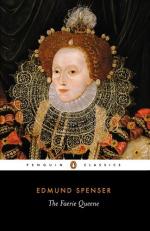2. “The lion is said to represent Henry VIII, overthrowing the monasteries, destroying church-robbers, disturbing the dark haunts of idleness, ignorance and superstition.”—Kitchin. The battle between Archimago and Sansloy refers to the contests of the Catholic powers with the Moslems. The whole canto also has a hint of the violence and lawlessness connected with the English conquest of Ireland.
LINE 14. THOUGH TRUE AS TOUCH, though true as if tested on the touchstone (by which true gold was distinguished from counterfeit).
18. AND HER DUE LOVES, etc., the love due to her diverted, etc.
27. YET WISHED TYDINGS, etc., yet none brought unto her the wished-for tidings of him. An awkward transposition.
34. THE GREAT EYE OF HEAVEN, the sun. Cf. Paradise Lost, v. 171.
38. A RAMPING LYON. Reason or Natural Honor; also Henry VIII. According to the ancient belief, no lion would attack a true virgin or one of royal blood. Similar scenes are found in Sir Bevis of Hampton, The Seven Champions of Christendom, etc. Cf. I Henry IV, ii, 4. The allegory signifies that man guided merely by reason will recognize Truth and pay it homage.
51. WHOSE YEELDED PRIDE, etc., object of had marked, l. 52.
77. HE KEPT BOTH WATCH AND WARD, he kept awake and guarded her.
89. A DAMZELL SPYDE, Abessa, who symbolizes Flagrant or Secret Sin.
99. HER CAST IN DEADLY HEW, threw her into a deathly paleness.
101. UPON THE WAGER LAY, was at stake.
102. WHEREAS HER MOTHER BLYND, where her blind mother, Corceca, or Blind Devotion.
109. UNRULY PAGE. This refers to the violence with which Henry VIII forced Protestantism upon the people. In his Present State of Ireland (p. 645), Spenser speaks of the ignorance and blind devotion of the Irish Papists in the benighted country places.
116. PATER NOSTERS, the Lord’s Prayer; AVES, prayers to the Virgin.
136. ALDEBORAN, the Bull’s Eye, a double star of the first magnitude in the constellation Taurus.
137. CASSIOPEIAS CHAIRE, a circumpolar constellation having a fancied resemblance to a chair.
139. ONE KNOCKED AT THE DORE, Kirkrapine, the plunderer of the Church. Spenser represents in him the peculiar vices of the Irish clergy and laity.
166. STAY HIM TO ADVIZE, stop to reflect.
172. HIM BOOTETH NOT RESIST, it does him no good to resist. This whole passage refers, perhaps, to Henry VIII’s suppression of the monasteries and convents in 1538-39.
185. THAT LONG WANDRING GREEKE. Ulysses, or Odysseus, the hero of Homer’s Odyssey, who wandered ten years and refused immortality from the goddess Calypso in order that he might return to Penelope.
xxii. Note the rhymes deare, heare, and teare (air). This 16th century pronunciation still survives in South Carolina. See Ellis’s Early English Pronunciation, III, 868. This stanza reads like the description of an Irish wake.




